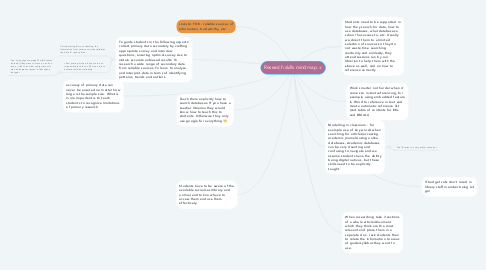Research skills mind map
by Georgieva Lydia

1. To guide students in the following aspects: collect primary data accurately by crafting appropriate survey and interview questions, ensuring optimal survey size to obtain accurate unbiased results. To research a wide range of secondary data from reliable sources. To learn to analyse and interpret data in terms of identifying patterns, trends and outliers.
1.1. Corroborating & cross checking the information from various sources validates the data & reduce bias
1.2. I find primary data in Econs to be an impossible task for an EE if you are to achieve sufficient reliability
1.2.1. Yes...strongly encourage World Studies instead if they want to focus on an Eco issue + link to another subject areas/s - we had huge successes in that space last year.
2. Links to TOK - reliable sources of information, trustworthy, etc
3. Teach them explicitly how to search databases. If you have a teacher librarian they would know how to teach this to students. Otherwise they only use google for everything :-)
4. Students have to be aware of the available resources (library and online) and to know have to access them and use them effectively.
5. accuracy of primary data can never be ensured no matter how large is the sample size. What is more important is to teach students to recognize limitations of primary research.
6. Modelling in classroom - for example use of key words when searching for articles/accessing academic journals/using online databases. Academic databases can be very daunting and confusing to navigate and we assume students have the ability being digital natives, but these skills need to be explicitly taught.
6.1. The librarian is a very useful resource!
7. Students need to be supported in how they search for data, how to use databases, what databases a school has access to, etc. Usually we direct them to a limited selection of sources so they do not waste time searching randomly and aimlessly, they attend sessions run by our librarian to help them with the above as well, and on how to reference correctly
8. If budget cuts don't result in library staff member being let go!
9. Work smarter not harder when it comes to in-text referencing, for example using embedded feature in Word to reference in text and create automatic reference list (and table of contents for EEs and BM IAs)
10. When researching take 3 sections of a whole article/document which they think are the most relevant and place them in a seperate doc. I ask students then to relate the information to areas of guide/syllabus they want to use.


